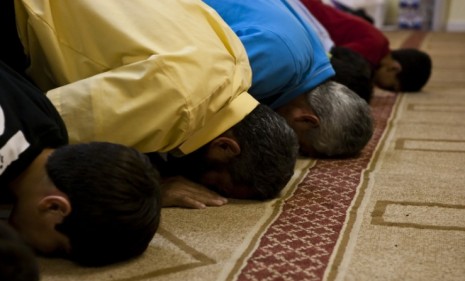Is Tennessee's Shariah law ban unconstitutional?
Conservative lawmakers in the Volunteer State want to make the Islamic code illegal. Does that violate the First Amendment?

A free daily email with the biggest news stories of the day – and the best features from TheWeek.com
You are now subscribed
Your newsletter sign-up was successful
Tennesse may become the first state to outlaw Shariah law. Islamic academics protest that the state bill is unconstitutional, as it would make it illegal for Muslims to worship. Conservative state lawmakers say the measure targets only those who practice what they call the "extreme" form of Shariah law, or jihadism. Republican Sen. Bill Ketron of Murfreesboro, the bill's sponsor, says making Shariah a crime would be a "powerful counterterrorism tool." Is this an anti-terrorism measure, or an attack on the First Amendment rights of American Muslims? (Watch an AP report about the controversy)
Banning Shariah law would be banning Islam: Shariah law isn't about "imposing Islamic beliefs" on others, says Rob Boston at The Wall of Separation. It mostly deals with "purely religious matters" such as "when to pray, how to pray, where to pray, etc." This "blatantly unconstitutional" bill would make anyone engaging in such private religious activities a felon. Conservative lawmakers must drop this "anti-Muslim crusade."
"Tennessee intolerance: Legislators propose jailing followers of Islamic law"
The Week
Escape your echo chamber. Get the facts behind the news, plus analysis from multiple perspectives.

Sign up for The Week's Free Newsletters
From our morning news briefing to a weekly Good News Newsletter, get the best of The Week delivered directly to your inbox.
From our morning news briefing to a weekly Good News Newsletter, get the best of The Week delivered directly to your inbox.
But this bill is about terrorism, not Islam: Did these critics actually read the bill? asks Mollie Hemingway at Get Religion. It specifically protects the "peaceful practice of Islam." It targets only those involved in "Shariah-based jihad and terrorism," giving the state "more legal tools" to fight Muslim groups that support the overthrow of the U.S. government by violent means. The bill may be flawed, but it has nothing to do with banning Islam.
"Taking Sharia seriously in Tennesee"
It wouldn't outlaw Islam, but it is still discriminatory: The bill wouldn't ban Muslims from practicing Islam, says Jerome McCollom at Opposing Views, but it's still unconstitutional. This legislation would impose a greater penalty on terrorist plotters if they proposed killing "in the name of Shariah or Islamic law." That effectively "signals out one religion and its believers for extra punishment," which is unconstitutional. And it ignores the fact that terrorism is already illegal, whatever your religion.
"Why is Tennessee worried about Islamic law in Bible belt?"
A free daily email with the biggest news stories of the day – and the best features from TheWeek.com


